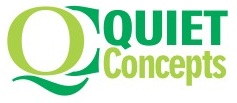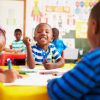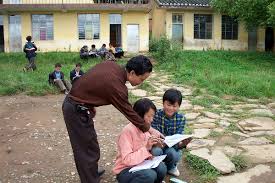THE COMPETENCY LEVEL OF GIFTED AND TALENTED STUDENTS IN THE USE OF SCIENCE LABORATORY APPARATUS AND EQUIPMENT IN SELECTED SECONDARY SCHOOLS
₦10,000.00 ₦3,000.00
ABSTRACT
This study examined competency of gifted and talented students in the use of laboratory apparatus. The study employed a survey research method to collect information on the competency of gifted and talented students in the use of laboratory apparatus. The population of the study comprises of four (4) selected secondary schools in Oyo West Local Government, Oyo State. The researcher randomly selected sixty (60) students from the selected school for the study. The instrument used in collecting the data for this study was questionnaire titled “Competency Level of Gifted and Talented Students in the use of science laboratory apparatus and equipment” to elicit response to the seven (7) research questions raised in chapter one. TEST Re-test reliability method was used to estimate reliability of the instrument, r = 0.72
In analyzing the data, the researcher used experimental statistics with the use of Chi-Square. The results of the study revealed that the two hypotheses were rejected.
Based on the findings of this study, it was recommended that the research should be adopted in aiding the standard of education of secondary school students in the schools and other neigbouring schools. Also, Federal government should consider this project in order to consider the use of science laboratory apparatus in public schools across the nation.
KEY WORDS: Competence, Gifted and talented students, Laboratory apparatus,
Description
CHAPTER ONE
1.0 BACKGROUND TO THE STUDY
1.1 Introduction
Education is universally recognized as a form of investment in human capital for economic benefit of countries. The objective of providing quality Education in Nigeria is a concern that has preoccupied the minds of parents, educationists and the government till date. The worth of a learners output is determined by the quality of Education offered to the learner either formally or informally (Hofstein, 2004). Secondary Education is important as it constitutes an investment in Education that yields considerable social and private returns. One importance of Secondary Education is the moulding of earners into responsible citizens of tomorrow and that cannot be undermined (Kurian, 2008). Availability of necessary physical facilities enhances quality of teaching and learning and the academic performance of learners in all subjects. The direction of teaching and learning of Science subjects in schools is expected to lead students to acquiring the required Science Process skills, life skills and competence as enshrined in the revised edition of National Policy on Education (FRN, 2013).
Laboratory work is an indispensable part of Science instruction and no effective Science Education can exist without practical work (Udo, 2010), which are dependent on the level of equipping of the laboratory with relevant apparatus and the ability of the teacher to effectively and efficiently utilize them. The main purpose of laboratory work in Science Education is to provide students with conceptual and theoretical knowledge to help them learn scientific concepts and through scientific methods to understand the nature of Science (Dan-Ologe & Shittu, 2012). Availability of laboratory equipment, facilities and materials play a vital role in determining the extent of best laboratory practices that will ensure acquisition of Science Process skills and competence in Science concepts by the learners (Katcha & Wushishi, 2015).
Science students have been performing below expectation and poor performance of students in science subject is persistent (Awolaju, 2016). Nwosu, (2014) discovered a low competency level of secondary school students in identification and stating names of chemistry laboratory apparatus. Among the reasons responsible for these poor performance includes poor laboratory practical activities due to large class size, inadequate laboratory equipment and often many Science teachers and students thought the subjects to be simpler than other. Science subjects and instructional materials seems to be very common as they can be sourced in the environment (Awolaju, 2016).
However, the students and teachers always discover that required materials are in short supply considering the large number of students to utilize those materials (Katcha & Wushishi, 2015). Studies also carried out at the university level in Turkey indicate that students cannot properly recognize laboratory materials and equipment (Costu, Ayas, Calik, Ünal, & Karatas, 2005). Similar researches conducted in Nigeria (Awolaju, 2016) also indicate a low level of competency among teachers and students. Challenges often faced in carrying out practical in inadequately equipped laboratories has led teachers to separate Science lessons into practical and theory lessons and/or shifting practical work till a conducive time. Science subjects must be properly taught in the laboratories where experiments are carried out to reinforce the practical skills of students. Okoth (2011) noted that the role of the laboratory has been increasingly marginalized in African schools, Colleges and Universities. He further stressed that this marginalization is a constraint on the teaching of Science (Physics, chemistry and Biology) in Africa. Attitudinal constraints, constraints imposed by examinations, constraints due to lack of apparatus and inability to improvise are some other constraints faced. Any educational system that does not have adequate resources cannot achieve quality Education. Okoth (2011) further pointed out that concrete experiences facilitate learning retention and usability of abstract symbols. Hands-on activities provide necessary concrete experiences in that skills that are hard to conceptualize are clearly showed. They also show how the processes of each skill relate to each other. Several factors have to be considered if the quality of education is to be raised. One of these factors is the availability of teaching resources. Facilities such as laboratory equipment and apparatus as well as other teaching aids are ingredients for effective teaching and learning.
Gifted Education also known as Gifted and Talented Education is a broad term for special practices, procedure and theories used in the education of children who have been identified as gifted or talented. There is no standard global definition of what a gifted student is. Multiple definitions of giftedness are used by different scholars. Most of these definitions select the students who are the most skilled or talented in a given area, for instance, the students with the most skill or talent in music, language, logical reasoning or mathematics. The percentage of students selected varies, generally with 10% of fewer being selected for gifted education programmes. The development of early intelligent test by Alfred Binet lead to the Standford-Binet I.Q test developed by Lewis Terman. Modern studies by James and Kulik as cited by Oluwakemi and Oluwaseun (2018) conclude that gifted students benefit least from working in a mixed level class, and benefit most from learning with other similarly advanced students in accelerated or enriched classes. Johnson (2004), states that gifted children all exhibit the potential for high performance in the areas included in the United State Federal definition of gifted and talented students. On the primary school level, students spend all class with their peers, but receive extra materials to challenge them. Enrichment may be as simple as a modified assignment provided by the regular classroom teacher or it might include formal programme such as Odyssey of the mind, Destination, Imagination or Academic Competitions, Nation History Day or Spelling bees.
Sandhu (2017), also defines reading as a cognitive process that involves decoding symbols to arrive at meaning. Sandhu (2017), further adds that reading is an active process of constructing meanings of words. Reading with a purpose helps the reader to direct information towards a goal and focuses their attention.
It is against this background that the researcher intends to determine the competency of gifted and talented students in the use of laboratory apparatus and equipment in secondary schools.
1.2 Statement of Problem
Science subjects are believed to be difficult for all students. This is because they are not only theoretical subjects, they involved practical which will be done in laboratory with the use of laboratory apparatus. On the other side, students who are gifted and talented are known with some characteristics which include hyper-active in taking decision. Meanwhile, this may be difficult in science classes. On this, the researcher is bothered on the competency of gifted and talented students in the use of laboratory apparatus and equipment in secondary schools.
1.3 Research Questions
The following research questions are posited to guide this study:
- To what extent will Senior Secondary students identify and state name and uses of some laboratory apparatus?
- What is the competency level of students in identifying and stating name and uses of some laboratory apparatus based on gender?
- To what extent does location of Biology students affects their competence level in identification and stating name and uses of some laboratory apparatus?
- What types of science laboratories equipments and apparatus are available in the selected schools?
- How well equipped are the science laboratories in the selected schools?
- What is the pattern of usage of the science laboratory equipment and apparatus by the students and teachers in the selected schools?
- To what extent are the safety measures incorporated in both the design and management of science laboratories?
1.4 Purpose of the Study
The purpose of this study is to determine the competency level of Senior Secondary students in identifying and stating names and uses of some laboratory apparatus. Also, to ascertain the competency level of students in identifying and stating names and uses of some laboratory apparatus based on gender. In addendum, this study tends to determine if the location of the students influence their competency level in identifying and stating names and uses of some laboratory apparatus.
1.5 Scope of the Study
The scope of this study is some selected secondary schools in Oyo town.
1.6 Definition of Terms
Competence: This is the ability of students in using the laboratory apparatus efficiently without being damaged.
Gifted and Talented Student:- This refers to the quality in a student who has achieved recognition because of his/her unique accomplishment and creative contributions possess a relatively well defined set a three interlocked clusters, which consist of above average general intellectual ability, task commitment and creativity.
Laboratory: It is a place providing opportunities for experimentation observation or practice in a field of study.
Laboratory Apparatus: These are the most common utensils and appliances that students use while performing hands-on activities in a laboratory.







Reviews
There are no reviews yet.